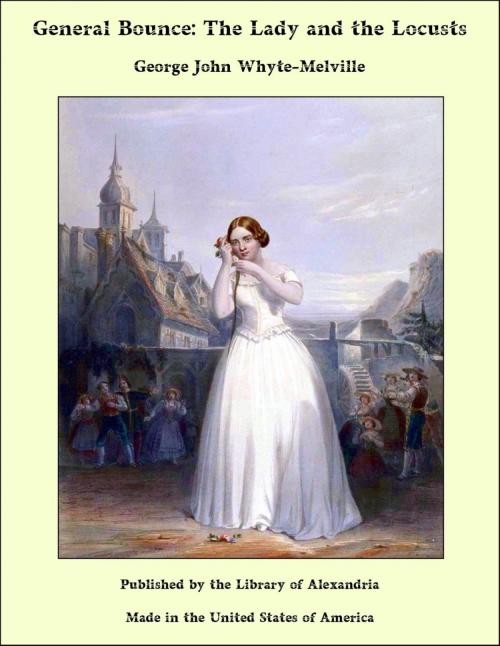General Bounce: The Lady and the Locusts
Nonfiction, Religion & Spirituality, New Age, History, Fiction & Literature| Author: | George John Whyte-Melville | ISBN: | 9781465576668 |
| Publisher: | Library of Alexandria | Publication: | March 8, 2015 |
| Imprint: | Language: | English |
| Author: | George John Whyte-Melville |
| ISBN: | 9781465576668 |
| Publisher: | Library of Alexandria |
| Publication: | March 8, 2015 |
| Imprint: | |
| Language: | English |
Much as we think of ourselves, and with all our boasted civilisation, we Anglo-Saxons are but a half-barbarian race after all. Nomadic, decidedly nomadic in our tastes, feelings, and pursuits, it is but the moisture of our climate that keeps us in our own houses at all, and like our Scandinavian ancestors (for in turf parlance we have several crosses of the old Norse blood in our veins), we delight periodically—that is, whenever we have a fortnight’s dry weather—to migrate from our dwellings, and peopling the whole of our own sea-board, push our invading hordes over the greater part of Europe, nor refrain from thrusting our outposts even into the heart of Asia, till the astonished Mussulman, aghast at our vagaries, strokes his placid beard, and with a blessing on his Prophet that he is not as we are, soothes his disgust with a sentiment, so often repeated that in the East it has become a proverb—viz. that “There is one devil, and there are many devils; but there is no devil like a Frank in a round hat!” It was but last autumn that, stepping painfully into our tailor’s shop—for, alas! a course of London dinners cannot be persisted in, season after season, without producing a decided tendency to gout in the extremities—hobbling, then, into our tailor’s warehouse, as he calls it, we were measured by an unfledged jackanapes, whose voice we had previously heard warning his brother fractions that “an old gent was a waitin’ inside,” instead of that spruce foreman who, for more years than it is necessary to specify, has known our girth to an inch, and our weight to a pound. Fearful that in place of the grave habit of broadcloth which we affect as most suitable to our age and manner, we might find ourselves equipped in one of the many grotesque disguises in which young gentlemen now-a-days deem it becoming to hide themselves, and described by the jackanapes, aforesaid, who stepped round us in ill-concealed admiration of our corpulence, as “a walking coat, a riding coat, a smoking coat, or a coat to go to the stable in!” we ventured to inquire for “the person we usually saw,” and were informed that “the gent as waited on us last year had gone for a few months’ holiday to the Heast.” Heavens and earth, Mr. Bobstitch was even then in Syria! What a Scandinavian! rather degenerate to be sure in size and ferocity—though Bobstitch, being a little man, is probably very terrible when roused—but yet no slight contrast to one of those gaunt, grim, russet-bearded giants that made the despot of the Lower Empire quake upon his throne. And yet Bobstitch was but obeying the instinct which he inherits from the sea-kings his ancestors, an instinct which in less adventurous souls than a tailor’s fills our watering-places to overflowing, and pours the wealth, while it introduces the manners, of the capital into every bight and bay that indents the shores of Britain.
Much as we think of ourselves, and with all our boasted civilisation, we Anglo-Saxons are but a half-barbarian race after all. Nomadic, decidedly nomadic in our tastes, feelings, and pursuits, it is but the moisture of our climate that keeps us in our own houses at all, and like our Scandinavian ancestors (for in turf parlance we have several crosses of the old Norse blood in our veins), we delight periodically—that is, whenever we have a fortnight’s dry weather—to migrate from our dwellings, and peopling the whole of our own sea-board, push our invading hordes over the greater part of Europe, nor refrain from thrusting our outposts even into the heart of Asia, till the astonished Mussulman, aghast at our vagaries, strokes his placid beard, and with a blessing on his Prophet that he is not as we are, soothes his disgust with a sentiment, so often repeated that in the East it has become a proverb—viz. that “There is one devil, and there are many devils; but there is no devil like a Frank in a round hat!” It was but last autumn that, stepping painfully into our tailor’s shop—for, alas! a course of London dinners cannot be persisted in, season after season, without producing a decided tendency to gout in the extremities—hobbling, then, into our tailor’s warehouse, as he calls it, we were measured by an unfledged jackanapes, whose voice we had previously heard warning his brother fractions that “an old gent was a waitin’ inside,” instead of that spruce foreman who, for more years than it is necessary to specify, has known our girth to an inch, and our weight to a pound. Fearful that in place of the grave habit of broadcloth which we affect as most suitable to our age and manner, we might find ourselves equipped in one of the many grotesque disguises in which young gentlemen now-a-days deem it becoming to hide themselves, and described by the jackanapes, aforesaid, who stepped round us in ill-concealed admiration of our corpulence, as “a walking coat, a riding coat, a smoking coat, or a coat to go to the stable in!” we ventured to inquire for “the person we usually saw,” and were informed that “the gent as waited on us last year had gone for a few months’ holiday to the Heast.” Heavens and earth, Mr. Bobstitch was even then in Syria! What a Scandinavian! rather degenerate to be sure in size and ferocity—though Bobstitch, being a little man, is probably very terrible when roused—but yet no slight contrast to one of those gaunt, grim, russet-bearded giants that made the despot of the Lower Empire quake upon his throne. And yet Bobstitch was but obeying the instinct which he inherits from the sea-kings his ancestors, an instinct which in less adventurous souls than a tailor’s fills our watering-places to overflowing, and pours the wealth, while it introduces the manners, of the capital into every bight and bay that indents the shores of Britain.















